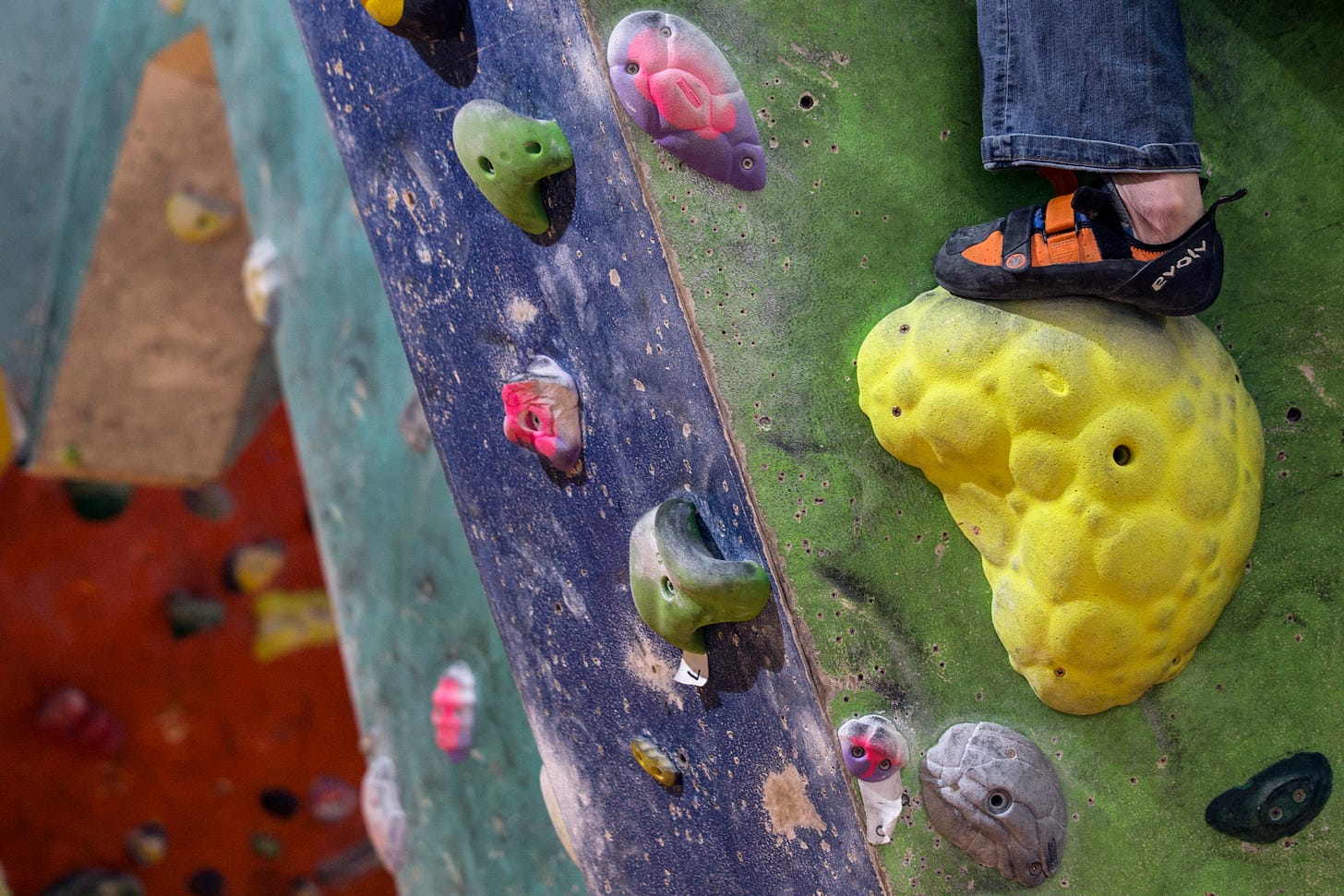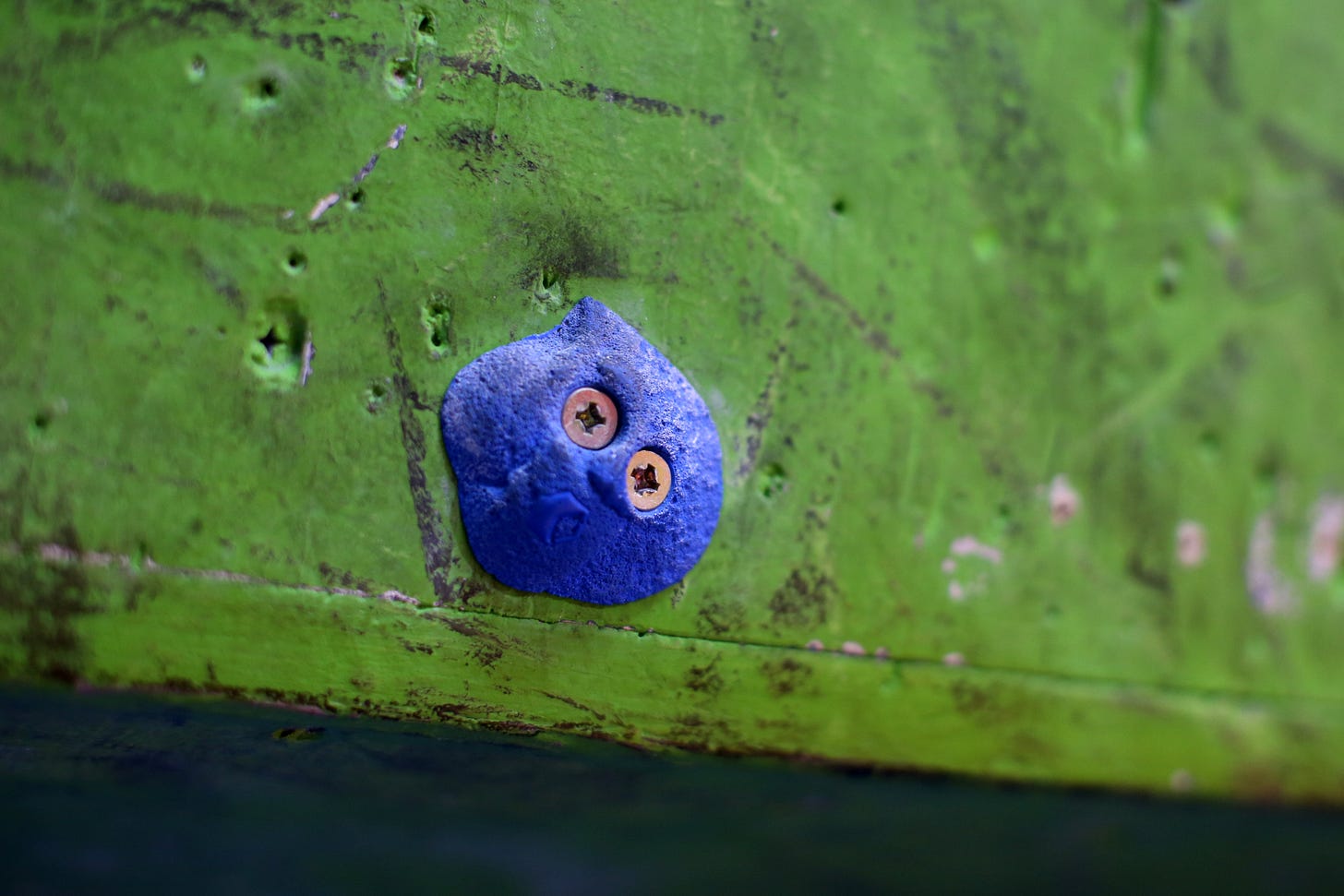Dear readers! I’m very sorry to announce this week that I have become one of those people who “boulders”—and, even worse, that I am now going to subject you to some comparisons between said activity and the art of writing. I can’t resist! The parallels are simply overpowering, and, furthermore, I already started and abandoned three different versions of today’s newsletter and finally had to resort to this last-minute overcaffeinated riff.
So: Picture me midway up a fifteen-foot-tall indoor wall, clinging to a pair of colorful plastic blobs, one foot jammed painfully against a plastic nubbin the size of a coin purse while the other flops around in search of a second toehold, and you will have a pretty good idea of my facility at this new hobby and also my feeling state at my desk most mornings. Bouldering and writing: They are all reaching, grasping, straining, scooting, slipping, and falling—and falling and falling and falling—with the very occasional bliss of a completed ascent, after which you immediately move on to a new problem that you can’t quite solve.
Countless essayists have mined the similarities between writing and running. They are both daily-ish disciplines that rely on rhythm and endurance, and that allow for occasional stretches of druglike flow. I always wanted to be a runner. And I have tried to become one: I’ve studied the couch-to-5K programs, downloaded the apps, journeyed to the highly-rated independent running store and had my feet scanned by the special machine in order to get the just-right shoes. (I even got the special socks they recommended on top of that.) All for naught: My left knee simply will not tolerate it, no matter how gradually I ramp up the intensity or how much ice I apply afterward. My doctor’s advice: “Stop running.” Some people just aren’t built for flow?
Bouldering is anti-flow. A lot of it is just sitting around staring at the wall until you’re ready to make another attempt. Just like writing! And the sheer frustration of it, you come to find, is also the thing that keeps you interested—is even the fun part?
One big difference between bouldering and writing: Clinging to the bouldering wall, I’m not thinking, or just barely. God, how I love to not think! Writing, by contrast, is all thinking, and thinking about thinking, and realizing how a lot of what you think seems pretty dumb when you write it down. (Including possibly this essay?) You have to think better to write better—good luck! To boulder better you just have to keep throwing yourself at the wall.
Ah, but now we’re back to the similarities. To write better you just have to keep throwing yourself at the wall, too. This reminds me of a Virginia Woolf line I’ve always loved, where she praised another writer for “eking out a delicate gift laboriously”—one of my all-time favorite descriptions of the writing process, and so perfect in itself that I completely forgot the larger context and had to look it up.
It’s from a 1925 Vogue essay on the Irish novelist, poet, and critic George Moore, a contemporary of Woolf’s whose novels, she admits, maybe aren’t the best but whose just-published memoirs she admires. We’re pretty far from bouldering now, but please allow me to wrap up by sharing a larger chunk of Woolf’s eking passage, which I see now is in a sneaky way as potent an artistic manifesto as I’ve ever read?
Woolf writes:
Keep reading with a 7-day free trial
Subscribe to Subtle Maneuvers to keep reading this post and get 7 days of free access to the full post archives.



